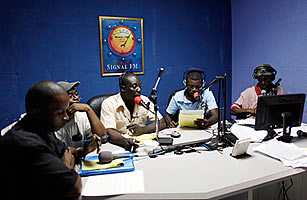
Signal FM radio station in Port-au-Prince, Haiti
In Haiti's devastation and upheaval since the Jan. 12 earthquake there has been one constant: the sound of Signal FM, the only radio station in the country that remained on the air after the quake hit, broadcasting through the following tumultuous days. "I cannot tell you how this happened, but our antennae did not fall down," the station manager Mario Viau told TIME by phone on Friday. "We stayed here and just kept going." With telephone and electricity lines down, and fuel scarce, Signal FM has been a lifeline for Haitians — one of the few sure ways people have had to relay details of where needs are most urgent, and to broadcast information about the missing. Search and rescue teams kept tuned permanently to the station for news of signs of life, often rushing across the city to investigate reports. A Russian team heard on the radio that people were trapped under a private residence in Delmas. They found three men, two of whom they were able to bring out alive.
An hour after the earthquake jolted the station building in Pétionville near the capital Port-au-Prince, Viau and two reporters — the only three employees left inside — began what Viau calls a "panel discussion" which has barely ceased since. The city has shown its appreciation. Even as hundreds of Haitians arrived at the station with news of problems on specific streets or neighborhoods, many others have brought in plates of food for those working to keep the station running.
Ordinary citizens too have provided much of the station's content. Some have passed names of missing relatives, to be broadcast on the air in the hope that they will be listening. On Friday, when a group of people began ransacking a food store in downtown Porte-au-Prince, "we got the information on the air and said the police needed back up there," says Viau. "The people of Haiti have been our journalists." Meanwhile, foreign embassy officials have delivered notes to Signal FM to broadcast, telling their citizens in Haiti how to contact them. Haitian stations in the United States, France and Canada have all borrowed time on Signal FM to broadcast messages to family members in the stricken country.
All of Signal FM's 50 staff members survived the quake. But several have been hard hit by the tragedy. One journalist's child was killed, while several others' homes were severely damaged. In recent days some have begun trickling back to work, attempting to rebuild shattered lives. Since Haiti's banks remain closed, Viau is unable to pay his staff. "When you called I was sitting down with my wife trying to find a way to get cash," he says. "Our employees need money for their families."
Haitians need Signal FM to stay on the air. But keeping the broadcast going involves an increasingly difficult hunt for fuel to keep the station's two generators running. When the station's diesel stocks ran dry four days after the quake, government officials sent over 100 gallons. On Wednesday, Viau's former school friends delivered a further 100 gallons. But that is almost gone. "Tomorrow I have to hit the streets and start searching," Viau says. "But when you say Signal FM people help out."
Read more in the new book TIME Earthquake Haiti: Tragedy and Hope and support TIME Haitian relief efforts